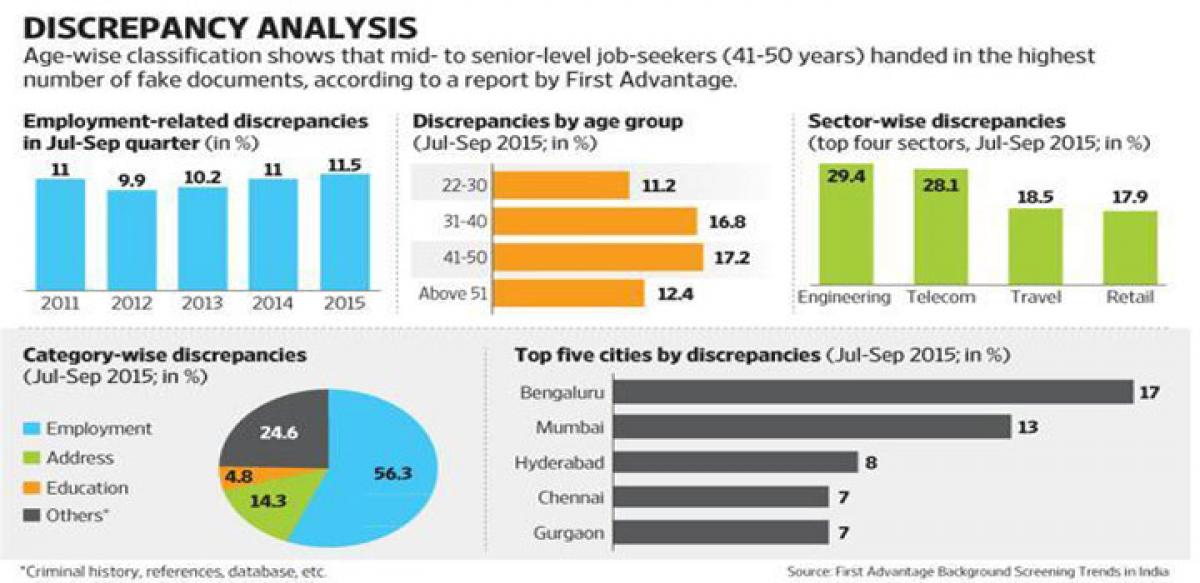Live
- 13th edition of ‘Hack AP Hackathon’ conducted
- Ayyappa devotees in thousands throng Yadagirigutta for Giri Pradakshina
- Former CM S M Krishna cremated with state honours
- Gali Janardhana Reddy announces gold-plating of Anjaneyaswamy Temple tower
- Private practitioner found operating from govt clinic
- PM stresses on thinking out-of-the-box in every sector
- Lokayukta cracks down, seizes illicit assets worth crores
- Farmers protest over delay in canal repair
- Amid continuing furore, five more maternal deaths occur in State
- Fostering a robust innovation
Just In

Frauds in job applications in India, including fake degrees and fudged employment credentials, maintained a “high trend” in the July-September period this year, perpetrated mainly by mid- to senior-level job-seekers and men.
Proportion of frauds slumps slightly to 11.5 per cent in September quarter from 12.3 per cent in the previous quarter, says report

New Delhi: Frauds in job applications in India, including fake degrees and fudged employment credentials, maintained a “high trend” in the July-September period this year, perpetrated mainly by mid- to senior-level job-seekers and men.
A so-called “discrepancy analysis” by First Advantage, a global background screening company, showed the proportion of frauds slumped slightly to 11.5 per cent in the third quarter of calendar year 2015 from 12.3 per cent in the previous quarter, but remained higher than the average for 2011-14.
The report came as the human resources ministry told the Lok Sabha on Monday that it is considering creating an academic depository to make verifying academic credentials easier.
The discrepancy analysis showed that the rate of discrepancies maintained the “high trend” at 11.5 per cent, and on average in the first nine months of 2015 the rate was above 11.5 per cent, the firm said. The discrepancy trend for the previous four calendar years— 2011, 2012, 2013 and 2014—showed an average of 10 per cent discrepancy in the first three years, rising to 10.5 per cent in 2014.
The higher discrepancies mean two things, said Purushotam Savlani, managing director of First Advantage: first, more companies are aware about the need for background screening, and second, there is more competition among job-seekers at both entry and middle levels.
Of all the cases that were verified, 60.1 per cent were in the 22-30 years group, indicating that firms are increasingly screening entry-level applicants for background checks. A further classification among age groups suggests that mid- to senior-level job-seekers (41-50 years) handed in the highest number of fake documents. Of all the candidates verified in the 41-50 age group, 17.2 per cent were found to have provided fudged information, the highest among all age brackets. In the combined 31-50 group, 34 per cent of those verified were found to have fudged documents.
“The competition in the mid-to-senior level is fierce and some want to accelerate in career further by giving discrepant information about their education, employment-related achievements, etc.,” Savlani said.
The survey, titled Background Screening Trends in India, took into account 750,000 samples from various sectors. Of all the discrepancies among job-seekers in the quarter ended September, 78 per cent were of men.
Among sectors, the discrepancy rate in the third quarter of 2015 was the highest in engineering (29.4 per cent), followed by telecom (28.1 per cent) and travel and hospitality (18.5 per cent).
Among geographies, southern India led in reported employment and address-related discrepancies, while the north led in education-related discrepancies. Among states, Karnataka, Maharashtra and Andhra Pradesh were the top states for discrepancies and among cities, it was Bengaluru and Mumbai.
Most discrepancies were related to employment (56.3 per cent), followed by address (14.3 per cent) and education (4.8 per cent), and all the numbers were higher than in the previous quarter. The remaining 24.6 per cent were related to criminal history, document investigation, references, etc. Of discrepancies related to educational qualifications, over 70 per cent were for the graduation level, with fake education documents topping the different kinds of forgeries.
On Monday, the human resource development ministry told the Lok Sabha that the government is considering “setting up of National Academic Depository Scheme, to ensure online storage, verification and authentication of academic awards”.
Source: First Advantage

© 2024 Hyderabad Media House Limited/The Hans India. All rights reserved. Powered by hocalwire.com







